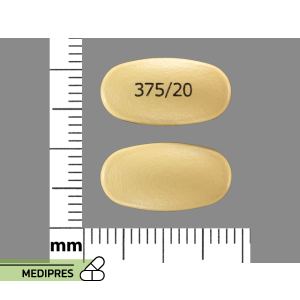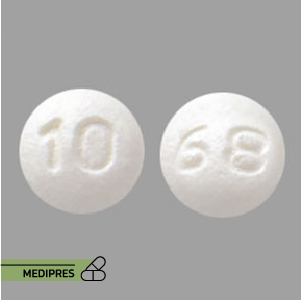
Venlafaxine
23 June, 2023
Vitamin D3
23 June, 2023Vitamin D
Generic name: Vitamin D
Drug class: Vitamin
Dosage forms: Capsules, Tablets, Liquid drops, Chewable tablets.
Root of administration: Oral
Dose:1000, 2000, 5000, 10000, 50000 IU (50, 125, 250 mcg)
Mechanism of action: Synthesis: Vitamin D can be synthesized in the skin when it is exposed to ultraviolet B (UVB) sunlight. Sunlight triggers the conversion of a cholesterol derivative in the skin to previtamin D3, which undergoes further transformation to form Vitamin D3 (cholecalciferol). Conversion: Vitamin D3 obtained from sunlight or dietary sources can undergo further conversion in the liver. In the liver, Vitamin D3 is hydroxylated to form 25-hydroxyvitamin D3 [25(OH)D3], also known as calcidiol. Activation: The next step of activation occurs in the kidneys. 25(OH)D3 is hydroxylated by the enzyme 1-alpha-hydroxylase to form the active metabolite known as 1,25-dihydroxyvitamin D3 [1,25(OH)2D3], also called calcitriol. Receptor Binding: Calcitriol then binds to the Vitamin D receptor (VDR), which is present in various tissues and cells throughout the body. The binding of calcitriol to VDR forms a complex that acts as a transcription factor, influencing gene expression. Gene Expression: The calcitriol-VDR complex regulates the expression of various genes involved in calcium and phosphorus homeostasis. It promotes the absorption of calcium and phosphorus from the intestines and enhances reabsorption of calcium in the kidneys. Furthermore, Vitamin D helps regulate bone mineralization by promoting the deposition of calcium and phosphorus in bone tissue. Other Functions: In addition to its role in calcium and bone metabolism, Vitamin D also modulates the immune system, influences cell growth and differentiation, and may have effects on various other tissues and systems in the body.
Drug usage cases: Vitamin D Deficiency: Vitamin D deficiency occurs when the body does not have enough Vitamin D to function properly. It can be caused by inadequate dietary intake, limited sun exposure, certain medical conditions, or impaired absorption. In cases of diagnosed deficiency, Vitamin D supplementation may be prescribed to restore adequate levels. Osteoporosis and Bone Health: Vitamin D plays a crucial role in maintaining bone health and preventing conditions like osteoporosis. It helps enhance calcium absorption in the intestines and promotes calcium deposition in bones. In individuals with osteoporosis or at risk of developing it, Vitamin D supplementation may be recommended along with other measures such as calcium supplementation and lifestyle modifications. Rickets and Osteomalacia: Rickets is a condition that affects children, characterized by softening and weakening of the bones. Osteomalacia refers to a similar condition in adults. Both conditions can be caused by Vitamin D deficiency. In these cases, Vitamin D supplementation is often prescribed to correct the deficiency and support proper bone development and mineralization. Chronic Kidney Disease: Individuals with chronic kidney disease (CKD) often have impaired kidney function, which can lead to decreased production of active Vitamin D. Vitamin D supplementation may be prescribed in CKD patients to maintain adequate levels of Vitamin D and support bone health. Certain Medical Conditions: Vitamin D supplementation may be recommended in individuals with certain medical conditions that can affect Vitamin D metabolism or absorption, such as inflammatory bowel disease (IBD), cystic fibrosis, celiac disease, or obesity.
Drug contra indications: Hypercalcemia: Vitamin D supplementation should be used with caution in individuals with a history of hypercalcemia (high levels of calcium in the blood) or conditions that increase the risk of hypercalcemia, such as hyperparathyroidism or certain types of cancer. Excessive intake of Vitamin D can lead to elevated calcium levels in the blood, which can have adverse effects on health. Vitamin D Hypersensitivity: Some individuals may have hypersensitivity or an allergic reaction to Vitamin D. If you have experienced an allergic reaction to Vitamin D or any of its formulations in the past, it is important to avoid Vitamin D supplementation and discuss alternative options with your healthcare professional. Certain Medical Conditions: Individuals with certain medical conditions, such as sarcoidosis, tuberculosis, or granulomatous disorders, may have altered Vitamin D metabolism. In these cases, Vitamin D supplementation should be used with caution and under the guidance of a healthcare professional. Medications: Certain medications can interact with Vitamin D, leading to potential adverse effects or altered effectiveness. It is important to inform your healthcare professional about all the medications and supplements you are taking to ensure there are no potential interactions. Pregnancy and Breastfeeding: Vitamin D supplementation is generally considered safe during pregnancy and breastfeeding, but it is important to follow the recommended dosages and consult with a healthcare professional for personalized advice.
Side effects: Hypercalcemia: Excessive Vitamin D intake can lead to increased levels of calcium in the blood, a condition known as hypercalcemia. Symptoms of hypercalcemia may include nausea, vomiting, constipation, frequent urination, excessive thirst, abdominal pain, muscle weakness, confusion, and in severe cases, cardiac arrhythmias. Hypercalcemia is more likely to occur with extremely high doses of Vitamin D. Hypervitaminosis D: Prolonged or excessive intake of Vitamin D can lead to a condition called hypervitaminosis D, which is characterized by elevated levels of Vitamin D in the body. Symptoms may include nausea, vomiting, poor appetite, weight loss, weakness, fatigue, headache, and in rare cases, kidney stones.
Warnings: Medical Conditions: If you have certain medical conditions, such as hypercalcemia, hyperparathyroidism, kidney disease, or granulomatous disorders, it is important to use Vitamin D supplements with caution and under the guidance of a healthcare professional. These conditions can affect Vitamin D metabolism and increase the risk of adverse effects. Medications: Vitamin D supplements can interact with certain medications, including corticosteroids, anti-seizure medications, and certain cholesterol-lowering drugs. It’s important to inform your healthcare professional about all the medications and supplements you are taking to prevent potential interactions. Allergies and Hypersensitivity: If you have a known allergy or hypersensitivity to Vitamin D or any of its components, it is important to avoid Vitamin D supplementation and discuss alternative options with your healthcare professional. Sun Exposure: While Vitamin D can be synthesized in the skin through exposure to sunlight, it’s important to balance safe sun exposure with the risk of sunburn and skin damage. It is advisable to follow appropriate sun protection measures, such as wearing sunscreen and protective clothing, to minimize the risk of skin damage. Dosage and Blood Levels: It’s important to avoid excessive intake of Vitamin D, as it can lead to adverse effects, including hypercalcemia. Regular monitoring of blood levels of Vitamin D and calcium may be recommended in certain cases to ensure optimal supplementation and prevent potential complications.
Use during pregnancy or breastfeeding: Pregnancy and Breastfeeding: Vitamin D supplementation is generally considered safe during pregnancy and breastfeeding when taken within the recommended dosages. However, it’s important to consult with a healthcare professional for personalized advice.



